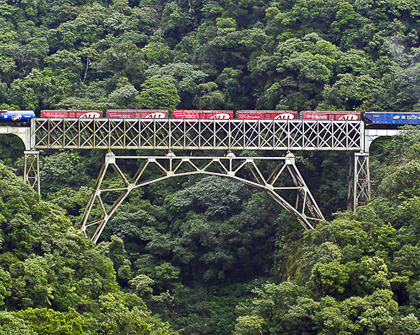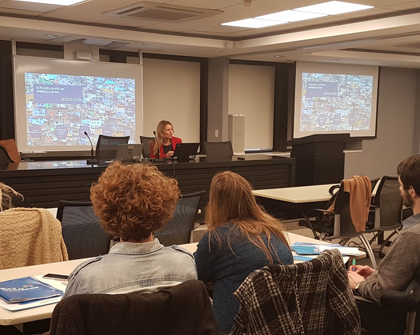What lessons and best practices could be drawn from regional trade agreements around services, e-commerce, value chains, agriculture, investment, manufacturing, and industrial policy? What are the main areas for improvement in Latin America’s negotiations on these issues? In the new global context, what mechanisms and approaches are being tested out within national and regional policies? How might these initiatives contribute to developing constructive regional agreements within Latin America and the world?
These are some of the questions that were discussed at the High-Level Dialogue held at INTAL-LAB (link in Spanish) on April 4, 2017. A high-profile group of government officials met with representatives from the private sector and academics as part of the work being carried out by the Integration and Trade Sector at the Inter-American Development Bank (IDB) and the International Centre for Trade and Sustainable Development (ICTSD).
Reflecting on the challenges facing regionalism in the current global context is essential given the upcoming WTO Ministerial Conference (December 2017) and the 2018 G20 Summit, both of which will be held in Buenos Aires, Argentina.
The opening words came from INTAL director Gustavo Beliz, who moderated the event. Miguel Braun, Argentina’s secretary of trade, and Shunko Rojas, the undersecretary for foreign trade, were the next to speak. Mr. Braun underlined the importance of the upcoming WTO Ministerial Conference and the G20 Summit. He argued for the need to articulate a positive, productive global agenda, adding that Argentina is at a point where it needs to forge closer ties with the world: the countries with which it has trade agreements account for just 10% of global GDP.
The internationalization strategy that authorities have put forward includes an ambitious agenda of new agreements, notably negotiations between the MERCOSUR and the European Union and the intensification of existing agreements. The proposed strategy contemplates the need to implement different measures to increase the efficiency of these existing agreements, which the recent signing of the MERCOSUR Investment Agreement is a good example of. Argentina’s regional strategy does not end with the MERCOSUR, as it is supporting the integration efforts of the Pacific Alliance, which is negotiating with developed countries outside the region, including Japan, Korea, and Canada, and with emerging countries in Asia and Africa.
Mr. Braun highlighted the progress made on trade facilitation through the implementation of single windows for foreign trade (VUCEs), a project which the IDB provided support for; the modification of electric safety standards[1] and the surety insurance project.
Ricardo Meléndez Ortiz, chief executive officer of the ICTSD, discussed the E-15 Initiative, which brings together numerous global experts and institutions to analyze key issues and make recommendations that will help governments, private companies, and civil society put the trade and investment system on the path to long-term sustainability. Working with the IDB’s Integration and Trade Sector, the E-15 Initiative has created the RTA Exchange platform, a global database of regional agreements which functions as a space for developing dialogue to promote sustainable, inclusive development that responds to global challenges.
According to Meléndez Ortiz, there is consensus within the WTO that non-multilateral agreements are an important part of a globally integrated trade and investment system. Although he drew attention to the problems of articulating bilateral agreements with the multilateral system, he pointed out that over the last 10 years, many of the former have gone far beyond the scope of the latter, expanding their coverage to include issues such as investment, e-commerce, competition rules, and other aspects of integration that are essential to the global economy.
He underlined that the WTO Ministerial Conference and the G20 Summit are the two most important governability events in the world and thus offer Argentina, in particular, and the region as a whole a unique opportunity for setting out their vision and advancing their strategic agenda.
The uncertainty around the new US administration’s trade policy continues to perplex observers and, for now, makes it difficult to anticipate what the future might hold. However, Mr. Braun thought it plausible that what lies ahead is not a revival of old-fashioned forms of protectionism in the US, but rather a new offensive trade agenda which aims to open markets via nontraditional paths. This process would begin with the use of bilateral agreements in certain markets and continue with the extreme application of trade defense mechanisms such as antidumping and safeguards. All these changes should be seen as an opportunity.
In relation to Brexit, he drew attention to the declaration that British prime minister Theresa May made in January 2017 at the Davos summit. In essence, her message was that Great Britain would deepen its tradition of free trade and would seek to promote greater integration.
One consequence of Brexit and the US withdrawal from the TPP will be an upturn in bilateral and plurilateral negotiations. This redefinition of trade agreements is something that will undoubtedly affect Latin America in some way–for example, in its negotiations with Europe. The global context is thus forcing the region to generate new alliances and other integration arrangements. More bilateral and regional negotiations are thus to be expected.
In relation to the G20 Summit, Mr. Meléndez Ortiz argued that between 2008 and 2015, the group dealt with trade in a reactive fashion: the focus was on macroeconomic coordination, yet its analysis of the trade issue was marginal. Instead, what prevailed was the monitoring and oversight of the protectionist measures implemented in reaction to the financial crisis. This outlook changed in 2015 when China took over the presidency of the G20 and decided to connect and analyze the issues of trade and investment in aggregate form, for which it created a Working Group and drafted investment principles for sustainable development.
One point that was stressed was the effect of the recent disagreement among G20 finance ministers at the meeting in Baden-Baden in March 2017. This may prompt the need to review two issues at the upcoming international trade forums: What is protectionism and what is it not? What is fair and what is not within the rules of trade?
It was agreed at the Nairobi Summit that there is no consensus on the end of the Doha Round. However, this constitutes an “agreement to disagree,” which simply reveals the difficulties that WTO members face in moving forward. This may also be a stimulus to advance toward plurilateral negotiations.
Mr. Meléndez Ortiz argued that in the run-up to the Ministerial Conference in Buenos Aires, the focus should be on promoting certain issues that are key to the multilateral system, such as updating the trade facilitation package, which would also imply agreements around services, e-commerce, investment, the content of agricultural goods, and so on. Other issues on the agenda include updating fishing subsidies and agreeing on procedures that will spearhead the WTO’s work on the digital economy.
Finally, he remarked that there are beginning to be signs of new growth in trade and the global economy, including specific indicators for the US and the stabilization of commodity prices. In Mr. Meléndez Ortiz’s opinion, the future relationship between employment and technological change is the main issue moving forward, and this is particularly true in Latin America’s middle-income economies, which are starting to be threatened by strategies and economies that revolve around low labor costs and by those that are seeking to increase their productivity through technological change.
Felix Peña asked three questions, the answers to which may shape the current context. What ideas and proposals can Latin America bring to the two summits that will be held in Buenos Aires? How can the global environment contribute to an intelligent redesign in the region? What role might Argentina and the region play in building bridges toward integration? From now on, Latin America and the Caribbean need to view global and regional affairs in more complex terms, looking at them from a multidimensional, multilevel, and dynamic perspective. The answers to these questions could shape an appropriate agenda for the two events.
Víctor do Prado argued that the keys for Argentina and the region in the run-up to the WTO Ministerial Conference and the G20 Summit are understanding the current state of global affairs and events at the WTO in a context which has changed enormously in a short time. For the conference to be successful, “we need to forget what most people have already forgotten.” What he meant by this is that most WTO members do not want any more rounds of negotiation or single undertakings, and even “special and differential treatment” is becoming marginal.
Moving forward, the focus should be on developing a Ministerial Conference where “new seeds are sown,” as was the case at the Singapore Ministerial Conference, where the seed of trade facilitation was sown, which is beginning to bear fruit. In this sense, he argued that events in Buenos Aires should unfold as follows: first, there needs to be a political declaration that reasserts principles that are true for all members; and second, that declaration should come hand-in-hand with other topical issues such as e-commerce, fishing, investment facilitation, services, and SMEs. By doing so, the conference will “sow new mandates” for the future. Mr. Do Prado also insisted that Latin America has to better project two fundamental features which are often overlooked even within its own borders: the fact that it is a conflict-free region that is characterized by multiculturalism.
He further noted that discussions of issues related to e-commerce are long overdue within the WTO. However, he said that work is underway to remedy this through 11 proposals that different member countries have put forward. He also expressed his surprise that e-commerce is discussed much more in Argentina than in other countries. Another source of surprise for him ha been how the focus on agricultural negotiations in the private sphere seems to be shifting from the traditional perspective, which targeted subventions and the agroindustry trade-off, toward a new vision that emphasizes the sustainability and environmental impact of agriculture.
He ended by saying that the challenge of articulating plurilateral agreements with bilateral ones is a topic of discussion at the WTO.
Pedro Less Andrade, Google’s director of public policy and government affairs for Latin America argued that e-commerce needs to be regionalized to maximize its benefits for different stakeholders. A start-up that is successful in one country cannot grow enough if it continues to operate solely within that country’s borders—instead, it needs to move beyond these and become a regional success story. Mr. Less Andrade said that the greatest public policy difficulties facing online companies, especially start-ups, are related to adapting the different regulatory frameworks in each country. The core focuses for the sector are privacy, the role of intermediaries, platforms, means of payment, and tax issues. He ended by underlining that e-commerce is an opportunity to create synergies between the international and local levels.
Gonzalo Navarro, executive director of the Latin American Internet Association (ALAI), argued that we need to understand the nature of the internet, how it works, and the business models that operate through it. In other words, e-commerce is not the same as traditional forms of trade: although the two may have similar ends (the delivery of a service or good), their underlying logics are different. It is essential to understand the cross-border and technical matters at stake to be able to know when and where to regulate.
Pablo García, president of the Bank of Investment and Foreign Trade (BICE) argued that the potential for achieving positive outcomes at the Ministerial Conference will depend on the emergence of new global and regional rulemakers, which there is currently a shortage of. He was also skeptical vis-à-vis the possibility of progress on multilateral negotiations. Consequently, he underlined the need to take a pragmatic approach to the meeting at the end of the year by focusing on concrete issues such as trade in services and trade facilitation, and said the region should seek flexibility that will allow the bilateral, regional, and multilateral spheres to coexist.
This High-Level Dialogue provided a space not only for an exchange of strategic ideas around the two upcoming events, but also for positive interactions between government officials, private-sector representatives, and academics and researchers. The presence of international analysts also helped establish what aims should be paramount during these negotiations.
[1] Resolution E 207/2017 was published on March 20, 2017. Through it, Argentina’s Secretariat of Trade introduced significant changes to the technical regulations on low-voltage electrical equipment traded within the country, specifically in relation to certification standards that ensure products comply with essential safety standards (http://servicios.infoleg.gob.ar/infolegInternet/verNorma.do?id=272858 [link in Spanish]).






